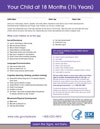Important Milestones: Your Child at Eighteen Months
How your child plays, learns, speaks, and acts offers important clues about your child’s development. Developmental milestones are things most children can do by a certain age.
Check the milestones your child has reached by the end of 18 months. Take this with you and talk with your child’s doctor at every visit about the milestones your child has reached and what to expect next.
What most babies do at this age:
Social and Emotional
- Likes to hand things to others as play
- May have temper tantrums
- May be afraid of strangers
- Shows affection to familiar people
- Plays simple pretend, such as feeding a doll
- May cling to caregivers in new situations
- Points to show others something interesting
- Explores alone but with parent close by
 Language/Communication
Language/Communication
- Says several single words
- Says and shakes head “no”
- Points to show someone what he wants
Cognitive (learning, thinking, problem-solving)
- Knows what ordinary things are for; for example, telephone, brush, spoon
- Points to get the attention of others
- Shows interest in a doll or stuffed animal by pretending to feed
- Points to one body part
- Scribbles on his own
- Can follow 1-step verbal commands without any gestures; for example, sits when you say “sit down”
Movement/Physical Development
- Walks alone
- May walk up steps and run
- Pulls toys while walking
- Can help undress herself
- Drinks from a cup
- Eats with a spoon
Act early by talking to your child’s doctor if your child:
- Doesn’t point to show things to others
- Can’t walk
- Doesn’t know what familiar things are for
- Doesn’t copy others
- Doesn’t gain new words
- Doesn’t have at least 6 words
- Doesn’t notice or mind when a caregiver leaves or returns
- Loses skills he once had
If You’re Concerned – Act Early
Tell your child’s doctor or nurse if you notice any of these signs of possible developmental delay for this age, andtalk with someone in your community who is familiar withservices for young children in your area, such as your state’s public early intervention program. For more information, visit our "If You’re Concerned" web page or call 1-800-CDC-INFO.
The American Academy of Pediatrics recommends that children be screened for general development using standardized, validated tools at 9, 18, and 24 or 30 months and for autism at 18 and 24 months or whenever a parent or provider has a concern. Ask your child’s doctor about your child’s developmental screening.
“Learn the signs. Act early.” materials are not a substitute for standardized, validated developmental screening tools.
Adapted from CARING FOR YOUR BABY AND YOUNG CHILD: BIRTH TO AGE 5, Fifth Edition, edited by Steven Shelov and Tanya Remer Altmann © 1991, 1993, 1998, 2004, 2009 by the American Academy of Pediatrics and BRIGHT FUTURES: GUIDELINES FOR HEALTH SUPERVISION OF INFANTS, CHILDREN, AND ADOLESCENTS, Third Edition, edited by Joseph Hagan, Jr., Judith S. Shaw, and Paula M. Duncan, 2008, Elk Grove Village, IL: American Academy of Pediatrics.

Contact Us:
- Centers for Disease Control and Prevention
National Center on Birth Defects and Developmental Disabilities
Division of Birth Defects and Developmental Disabilities
1600 Clifton Road
MS E-87
Atlanta, GA 30333 - 800-CDC-INFO
(800-232-4636)
TTY: (888) 232-6348
New Hours of Operation
8am-8pm ET/Monday-Friday
Closed Holidays - cdcinfo@cdc.gov





